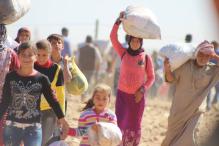Men account for most victims of reported violence worldwide, and in labour trafficking they also dominate figures. Yet, during conflicts and crises, despite being potential modern slavery victims, men are often ‘unseen’ in protective efforts for both anti-trafficking and financial inclusion.
In practice, this is shown to be especially acute when they are disabled; refugees/displaced; migrants; homeless; of diverse sexual orientation, gender identity, and expression (SOGIESC); and Black or from another racial minority group. The modern slavery risks to diverse men in times of crisis and their financial vulnerabilities are shown to be largely unappreciated in data, practices, policy, and funding, even when they are pervasive.
This UNU-CPR collaborative report with All Survivors Project focuses on two country case studies – Haiti and Poland – to explore how international policy and guidance is impacting national policy and local actors in their work to implement gender-responsive actions for preventing modern slavery and financial exclusion.
These case studies help identify common themes in relation to this policy area and shape the report’s recommendations – which are designed to enhance efforts to combat modern slavery and promote financial inclusion, inclusive of diverse men, during times of crisis.
The report is intended for diverse actors involved in financial inclusion responses to crisis and conflict settings, including not only financial service providers, but also humanitarian organizations, civil society actors, UN agencies and other multilateral organizations, and government entities.
Access ‘Modern Slavery and Financial Exclusion: Exploring Crisis-Related Risks for Men’ here.
An Executive Summary and Policy Brief are also available.
Suggested citation: Angharad Smith, Leona Vaughn, Toni Cela, Louis Herns Marcelin, Margaret Ohia-Nowak, Charu Hogg and Ronny Marty. Modern Slavery and Financial Exclusion: Exploring Crisis-Related Risks for Men : UNU-CPR, 2024.



